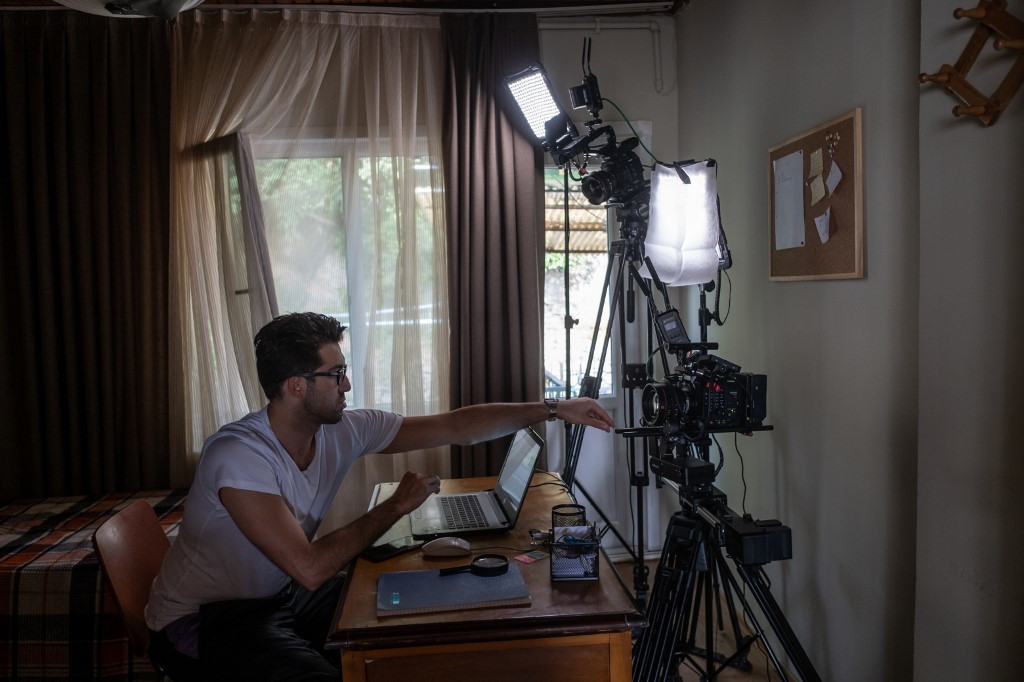Popular Reads
Top Results
Can't find what you're looking for?
View all search resultsPopular Reads
Top Results
Can't find what you're looking for?
View all search resultsShow goes on for Turkish drama despite virus rules
Turkey is known for its obsession with TV dramas -- also a massive export success -- and not even virus restrictions could stop the cast of "Tutunamayanlar" from keeping the show going.
Change text size
Gift Premium Articles
to Anyone
O
n a TV screen split into squares, a group of people speak on their laptops, taking turns and trying not to talk over each other.
What looks like a corporate video conference is in fact a Turkish television soap opera shot in isolation during the coronavirus pandemic.
Turkey is known for its obsession with TV dramas -- also a massive export success -- and not even virus restrictions could stop the cast of Tutunamayanlar from keeping the show going.
The drama, known as The Outcasts in English and aired by state-run TRT channel, kept viewers entertained by respecting the strict lockdown regulations throughout the pandemic even if it meant no makeup and no actors working together.
The last six episodes of the season, which wrapped up this week, were shot on video-conferencing platform Zoom.
Dogu Demirkol, who plays jobless man Tarik who keeps failing in life, said actors are adapting even though the virus upended how they perform.
"There's nobody next to me. I act on my own and the others are on their own, sometimes our dialogues clash. We try to perform without breaking into each other's roles," Demirkol told AFP in the wooden house where the series was being shot at a set complex in Beykoz on the Asian outskirts of Istanbul.
"It doesn't feel like real life, it's a bit artificial. I see how it is after I watch later... but still we're having fun," he said.
The coronavirus pandemic sweeping the globe forced Turkey into lockdown from mid-March, and has caused more than 4,500 deaths.
The government has now eased most of the restrictions including allowing restaurants and cafes to reopen this week.
Read also: Czech TV to show virus lockdown sitcom
'No costume, no makeup'
At the set, technical team members wear their protective "spacesuits," Demirkol said, and adjust the camera angle and settings before leaving him alone.
"There is a limited number of staff here. We're not wearing costumes, nobody takes care of our hair or makeup."
Demirkol earned international renown in 2018 for his performance in the film The Wild Pear Tree by top Turkish modern filmmaker Nuri Bilge Ceylan.
On the set, Demirkol gazes at the remote controlled camera and delivers his lines along with fellow cast members joining him on Zoom.
The director, who is in another city, interacts with the actor also via Zoom.
But the actor's cast mates act from home.
Demirkol said he preferred to work on set because he appeared in "half" of the series.
"If I keep sitting then everyone in the series will be doing so" which would bore the audience, he added.
"People are already bored at home. At least they see someone on the TV who moves."
Challenging early days
Emrah Gurel, a viewer, said he spent more time in front of the television screen while he was forced to stay at home.
"The series managed to make me laugh in those tough times.
"I didn't find the Zoom scenes bizarre. On the contrary, I thought it's quite like real life because in this process, we also spoke with friends via Zoom."
For technical staff, the first weeks of the outbreak proved challenging because it was hard to work in the protective gear, said Yener Yalcin, video assistant.
"We have adjusted our script accordingly, it's not like those we used to film. We have a different script, it's much more adjusted to the house setting."
University student Calgan Aygun, 18, said Demirkol played a big part in keeping the viewers glued to their screens.
"Dogu Demirkol's performance is key to the laughter and making the show watchable because he's also a stand up comedian," he said.
Read also: Pakistan goes wild for blockbuster Turkish drama
'Trademark'
Turkey's soap operas are taking the Arab world by storm, prompting TV executives to start importing Turkish series even to Latin American countries -- a region more used to exporting its own "telenovelas".
Recently, Turkish drama Resurrection: Ertugrul -- the five-season series featuring the makings of the Ottoman Empire -- earned praise in the Arab and Muslim world, gripping audiences and smashing television records.
Basak Aykut, art director for The Outcasts, said Turkish soap operas ranging from modern romances to historic dramas, filled with cliff-hanger plots and strong production, have achieved success worldwide.
"Turkey's series sector has become a trademark in the last decade and we have a major share in the world (industry)," she told AFP.
"I don't believe the current circumstances will harm the future of the sector because as long as people stay at home, they will watch television."











